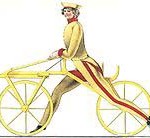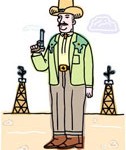 Just as the whales were getting really nervous, certain enterprising Unmerry Ones began digging in the ground for a new liquid* which they called “Oy y’all!” after the cry they uttered upon finding it. Oy y’all had, like Cole, taken hundreds of millions of years to form, and had once been tiny creatures and algae that had fallen to the prehistoric ocean floor and been buried under mud and sediment. Like Cole, it contained enormous reserves of energy, and like Cole, it was sold and burned as quickly as it could be pumped out of the ground. With the help of government tax breaks (not to be the last) Oy y’all, suitably refined, soon became the fuel of choice for Mutton lamps and lubrication.
Just as the whales were getting really nervous, certain enterprising Unmerry Ones began digging in the ground for a new liquid* which they called “Oy y’all!” after the cry they uttered upon finding it. Oy y’all had, like Cole, taken hundreds of millions of years to form, and had once been tiny creatures and algae that had fallen to the prehistoric ocean floor and been buried under mud and sediment. Like Cole, it contained enormous reserves of energy, and like Cole, it was sold and burned as quickly as it could be pumped out of the ground. With the help of government tax breaks (not to be the last) Oy y’all, suitably refined, soon became the fuel of choice for Mutton lamps and lubrication.
 There was one annoying by-product of the refining process, an extremely nasty form of Oy y’all which the Unmerry Ones called Gaz O’Lean and the Angry-Sackmen called Pet Roll. This stuff was too revolting for any use except to kill lice on Mutton children’s heads (what became of the children is not recorded) and most of it ended up being dumped in streams and rivers. This was irritating to the Oy y’all barons, not because they cared particularly what happened to streams and rivers (most of them would soon have their own swimming pools) but because the Gaz O’Lean wasn’t making them any money. Something would have to be done about that.
There was one annoying by-product of the refining process, an extremely nasty form of Oy y’all which the Unmerry Ones called Gaz O’Lean and the Angry-Sackmen called Pet Roll. This stuff was too revolting for any use except to kill lice on Mutton children’s heads (what became of the children is not recorded) and most of it ended up being dumped in streams and rivers. This was irritating to the Oy y’all barons, not because they cared particularly what happened to streams and rivers (most of them would soon have their own swimming pools) but because the Gaz O’Lean wasn’t making them any money. Something would have to be done about that.
 Meanwhile, back in the Old World, a quiet revolution was taking place. Two revolutions, to be exact, one a foot or so behind the other. For a long time far-sighted members of the flock had been toying with the idea of a Mutton-powered wheeled method of personal transport. They had begun by simply making a model of one of their four-legged friends, adding wheels where its hooves would have been, and scooting the contraption along with their feet. This had the dual effect of wearing out their shoes far more quickly than ordinary walking would have done, and of creating great hilarity among the Mutton onlookers.
Meanwhile, back in the Old World, a quiet revolution was taking place. Two revolutions, to be exact, one a foot or so behind the other. For a long time far-sighted members of the flock had been toying with the idea of a Mutton-powered wheeled method of personal transport. They had begun by simply making a model of one of their four-legged friends, adding wheels where its hooves would have been, and scooting the contraption along with their feet. This had the dual effect of wearing out their shoes far more quickly than ordinary walking would have done, and of creating great hilarity among the Mutton onlookers.
 But the visionaries were not down-hearted (a little bruised from time to time, but not downhearted) and over time they gradually got rid of the more anthropomorphic aspects of the contraption, replacing the animal’s body with a simple triangular framework, discarding two of the four wheels and adding pedals, brakes and air-filled tyres. The machine was no longer a hobby-horse, pedestrian curricle or velocipede; it was a Byk, and everybody wanted one. Even the Angry-Sackmen’s queen, a less bellicose monarch than old Bus, ordered a specimen of the three-wheeled variant to pedal herself around the palace gardens.
But the visionaries were not down-hearted (a little bruised from time to time, but not downhearted) and over time they gradually got rid of the more anthropomorphic aspects of the contraption, replacing the animal’s body with a simple triangular framework, discarding two of the four wheels and adding pedals, brakes and air-filled tyres. The machine was no longer a hobby-horse, pedestrian curricle or velocipede; it was a Byk, and everybody wanted one. Even the Angry-Sackmen’s queen, a less bellicose monarch than old Bus, ordered a specimen of the three-wheeled variant to pedal herself around the palace gardens.
 It wasn’t queens, though, or even the writers, artists and philosophers who took up Byking with such eccentric enthusiasm, who benefited most from the new invention. For the first time, ordinary Muttons, who could never have afforded to buy or look after a saddled animal of their own, could travel significantly further and faster than their feet could carry them. The Byk was, and still is, the most efficient form of Mutton transport ever, was cheap to buy and didn’t need stabling, feeding or rubbing down when it got too hot. The combination of the Byk and cheap train travel meant that city-dwelling Muttons no longer had to live in huddled hovels close to their workplaces; they could move out a few miles to healthier, more spacious houses where their children could breathe clean air and drink clean water. In the countryside, Muttons could Byk beyond their own villages in search of love, ending centuries of enfeebling inbreeding.
It wasn’t queens, though, or even the writers, artists and philosophers who took up Byking with such eccentric enthusiasm, who benefited most from the new invention. For the first time, ordinary Muttons, who could never have afforded to buy or look after a saddled animal of their own, could travel significantly further and faster than their feet could carry them. The Byk was, and still is, the most efficient form of Mutton transport ever, was cheap to buy and didn’t need stabling, feeding or rubbing down when it got too hot. The combination of the Byk and cheap train travel meant that city-dwelling Muttons no longer had to live in huddled hovels close to their workplaces; they could move out a few miles to healthier, more spacious houses where their children could breathe clean air and drink clean water. In the countryside, Muttons could Byk beyond their own villages in search of love, ending centuries of enfeebling inbreeding.
 For female Muttons the Byk was especially liberating; suddenly they were throwing away the ridiculous tent-like contraptions they had been clothed in and exploring the world beyond the chaperonage of their fathers and husbands.
For female Muttons the Byk was especially liberating; suddenly they were throwing away the ridiculous tent-like contraptions they had been clothed in and exploring the world beyond the chaperonage of their fathers and husbands.
Of course, not everyone liked the Byk, least of all the wealthiest of male Muttons. What was the point of being stinking rich if it didn’t mean that you could travel further and faster than the slightly smelly poor? Where was the great benefit of masculinity if mere females were to revel in the same freedoms? Worst of all, the Byk was losing them money. More and more young Muttons were spending their free time pedalling about the countryside, spending almost nothing except a few pennies on a bit of bread and cheese. Sales of tobacco, alcohol and other luxuries were plummeting.  There was money to be made in Byks themselves, of course, but it wasn’t the kind of easy pickings that the rich Muttons liked, not like the money gushing out of the ground in the form of Oy’all. Indeed, the name of one Oy’all-dealing Mutton, known as Flockaseller for his habit of bankrupting his neighbours, had already become synonymous with obscene and frankly ridiculous levels of wealth. There had to be something that Flockaseller and his cronies could do to get ordinary Muttons off their Byks and back to the important business of spending money they couldn’t afford on stuff they didn’t need. And if that something could involve getting rid of the unpleasant, unwanted Gaz O’Lean, so much the better.
There was money to be made in Byks themselves, of course, but it wasn’t the kind of easy pickings that the rich Muttons liked, not like the money gushing out of the ground in the form of Oy’all. Indeed, the name of one Oy’all-dealing Mutton, known as Flockaseller for his habit of bankrupting his neighbours, had already become synonymous with obscene and frankly ridiculous levels of wealth. There had to be something that Flockaseller and his cronies could do to get ordinary Muttons off their Byks and back to the important business of spending money they couldn’t afford on stuff they didn’t need. And if that something could involve getting rid of the unpleasant, unwanted Gaz O’Lean, so much the better.
*New to them, that was; other, quieter Muttons had been using it for four thousand years or so.